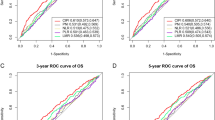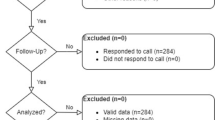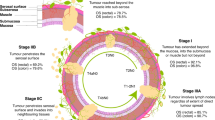Abstract
Despite the advances in pre-, peri- and post-operative medical care of colorectal carcinoma patients, the prognosis has improved only marginally over recent decades. Thus, additional prognostic indicators would be of great clinical value to select patients for adjuvant therapy. In previous studies we found that colorectal carcinomas have a marked increase of the urokinase-type of plasminogen activator (u-PA), and the inhibitors PAI-1 and PAI-2, whereas the tissue-type plasminogen activator (t-PA) is found to be decreased in comparison with adjacent normal mucosa. In the present study we evaluated the prognostic value of several plasminogen activation parameters, determined in both normal and carcinomatous tissue from colorectal resection specimens, for overall survival of 136 Dukes' stage B and C colorectal cancer patients, in relation to major clinicopathological parameters. Uni- and multivariate analyses indicated that a high PAI-2 antigen level in carcinoma, a low t-PA activity and antigen level and a high u-PA/t-PA antigen ratio in adjacent normal mucosa are significantly associated with a poor overall survival. A high ratio of u-PA antigen in the carcinomas and t-PA antigen in normal mucosa, i.e. u-PA(C)/t-PA(N), was found to be predictive of a poor overall survival as well. All these parameters were found to be prognostically independent of the clinicopathological parameters. Multivariate analysis of combinations of these prognostically significant plasminogen activation parameters revealed that they are important independent prognostic indicators and have in fact a better prognostic value than their separate components. Based on these combined parameters, subgroups of patients with Dukes' stage B and C colorectal cancer could be identified as having either a high or a low risk regarding overall survival. In conclusion, these findings emphasize the relevance of the intestinal plasminogen activation system for survival prognosis of patients with colorectal cancer and, in the future, might constitute a patient selection criterion for adjuvant therapy.
This is a preview of subscription content, access via your institution
Access options
Subscribe to this journal
Receive 24 print issues and online access
$259.00 per year
only $10.79 per issue
Buy this article
- Purchase on Springer Link
- Instant access to full article PDF
Prices may be subject to local taxes which are calculated during checkout
Similar content being viewed by others
Author information
Authors and Affiliations
Rights and permissions
About this article
Cite this article
Ganesh, S., Sier, C., Heerding, M. et al. Contribution of plasminogen activators and their inhibitors to the survival prognosis of patients with Dukes' stage B and C colorectal cancer. Br J Cancer 75, 1793–1801 (1997). https://doi.org/10.1038/bjc.1997.306
Issue Date:
DOI: https://doi.org/10.1038/bjc.1997.306
This article is cited by
-
MMP-2 and MMP-9 in normal mucosa are independently associated with outcome of colorectal cancer patients
British Journal of Cancer (2012)
-
ARNTL2 and SERPINE1: potential biomarkers for tumor aggressiveness in colorectal cancer
Journal of Cancer Research and Clinical Oncology (2012)
-
Tumor marker utility and prognostic relevance of cathepsin B, cathepsin L, urokinase-type plasminogen activator, plasminogen activator inhibitor type-1, CEA and CA 19-9 in colorectal cancer
BMC Cancer (2008)
-
Tissue-type plasminogen activator activity in morphologically normal tissues adjacent to gastrointestinal carcinomas is associated with the degree of tumor progression
Journal of Cancer Research and Clinical Oncology (2006)
-
Identifying patients with T3-T4 node-negative colon cancer at high risk of recurrence
Diseases of the Colon & Rectum (2001)



